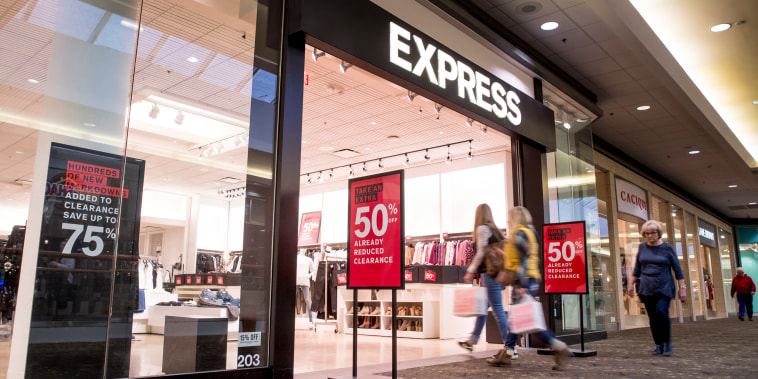Longtime mall retailer Express filed for Chapter 11 bankruptcy protection on Monday, but a group of investors led by brand management firm WHP Global is looking to save the company by acquiring it.
Express, whose portfolio includes its namesake banner, Bonobos and UpWest, said it will close 95 of its eponymous shops and all of its UpWest doors. Closing sales are expected to begin Tuesday. The company said hours for remaining stores won’t change and it will continue to accept orders and returns as usual.
In a news release, Express said it filed for bankruptcy to “facilitate” a sale process of most of its retail stores and operations to the investor group, which includes WHP, Simon Property Group and Brookfield Properties. It received a nonbinding letter of intent from the investors to buy the assets, and has also secured $35 million in new financing from some of its existing lenders, subject to court approval.
“The proposed transaction will provide Express with additional financial resources, better position the business for profitable growth and maximize value for the Company’s stakeholders,” Express said.
Express also secured $49 million in cash from the IRS related to the CARES Act — a critical influx of liquidity that the company had been waiting on to shore up its balance sheet.
“We continue to make meaningful progress refining our product assortments, driving demand, connecting with customers and strengthening our operations,” CEO Stewart Glendinning said in a statement.
“We are taking an important step that will strengthen our financial position and enable Express to continue advancing our business initiatives,” he added.
The business casual apparel brand, founded in 1980 by Les Wexner’s Limited Brands, has seen sales plummet over the last few years as debt and costly mall leases dragged down its business.
Earlier this month, CNBC reported that Express was struggling to pay its vendors on time, indicating it was in financial distress and struggling to manage cash flows. When retailers can’t pay their vendors, suppliers sometimes tighten payment terms or refuse to fulfill orders, which can further pressure a company’s liquidity.
Last spring, Express acquired Bonobos’ operating assets and related liabilities for $25 million from Walmart in a joint deal with WHP. The deal came as Express’ “core business was weak, and cash was tight,” GlobalData managing director Neil Saunders said in a Monday note.
Still, its biggest problem was declining revenue, which has fallen by about 10% since 2019, Saunders said.
“This stands in marked contrast to an apparel sector that has grown strongly over the same period. This has put the company under a lot of financial strain and has resulted in some significant losses. None of this is sustainable which is one of the reasons for bankruptcy,” said Saunders.
“The woes at Express are not all of its own making,” he said. “The formal and smart casual market for both men and women has softened over recent years because of a rise from working from home and the casualization of fashion. This puts Express firmly on the wrong side of trends and, in our view, the chain made too little effort to adapt.”
Bankruptcy will provide some key relief to Express and help it get back on stronger footing as it works to implement its turnaround strategy. It’ll allow the retailer to get out of costly and burdensome leases, many of which are in struggling malls, and has made the company more attractive to buyers.
Powerhouse law firm Kirkland & Ellis, which led Bed Bath & Beyond and many other failed retailers through their bankruptcies, is serving as Express’ legal counsel. Moelis & Co. has been tapped as its investment banker and M3 Partners has signed on as its financial advisor.







